Thanks to pastry chef and baker Wu Pao-chun (吳寶春), dried lychees have become so popular that the nation’s farmers have not been able to meet increasing demand from domestic and foreign bakeries.
Dried lychees were one of the ingredients Wu used to make his winning “Taiwan-style” bread at the 2010 Bakery World Cup in France, where he won the title of Master Baker in the bread category.
Since Wu’s victory in March and the publication of his recipe, local bakeries have ordered more than 10,000kg of dried lychees, he said.
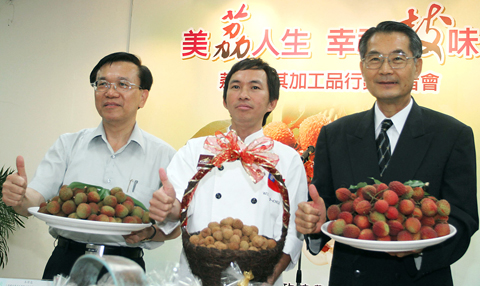
PHOTO: CNA
With supply falling short of demand, Wu said local farmers have limited Japanese importers to 1,000kg.
“That will definitely not be enough to meet Japanese needs,” said Wu, who has been invited by a flour company to visit Tokyo on Sunday to share his know-how with hundreds of representatives from Japanese bakeries.
“The government should do more to combine bakery expertise with local farmers to promote Taiwanese fruit exports,” Wu said, since many people in Japan, South Korea, Singapore and Malaysia love the fruit.
The government could act to ensure stable quality and supply of the fruit, he said, noting that some Taiwanese lychees have too much pesticide residue, which could prevent them from meeting Japanese standards.
“What I can do is develop good recipes that combine local ingredients with international baking techniques, and I think that is meaningful,” said Wu, who was also a winner of the Louis Lesaffre Cup in 2007 and a silver medalist in the 2008 Bakery World Cup’s team competition.
Wu said he is also developing new products using Taiwanese pineapples, bananas and oranges.
“I have a special regard for pineapples, because my late mother used to plant pineapples in Pingtung,” Wu said, adding that he wants to develop breads, jams and cakes featuring the fruit.
With the government trying to boost banana sales to help farmers cope with a price drop, Wu said bananas, along with chocolate, are ideal ingredients for making tasty Viennese pastries.
“It may take me some time to develop a successful recipe. But once I’ve done it, I will teach others the following day,” he said.
Wu said that he is not afraid of sharing his knowledge with other pastry chefs, which he described as a kind of self-cleaning process.
“I can start learning new things after I return myself to zero,” he said.
Wu, who made a name for himself in Kaohsiung before moving to a bakery in Taipei, said he plans to open his own shop in Kaohsiung by the end of next month — after an oven arrives from Germany.
The German oven will cost him about NT$1.7 million (US$52,000), almost triple the cost of a high-end local oven, but he said it will ensure the bread’s moisture and flavor.
Wu said he is not in a hurry to open more shops in Taiwan.
“I need to be 100 percent sure that product quality will be the same before I open a second bakery,” he said.
Wu also said he has turned down many investment offers from China because he believes only a wholly owned bakery can grant him the freedom he needs to develop his art.
“I want to open a bakery with products that taste so good people from Taipei or Taichung will take a high-speed train, or people in China or Japan will take a flight, just to visit,” he said.
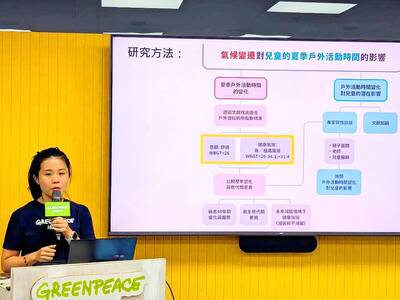
The government should improve children’s outdoor spaces and accelerate carbon reduction programs, as the risk of heat-related injury due to high summer temperatures rises each year, Greenpeace told a news conference yesterday. Greenpeace examined summer temperatures in Taipei, New Taipei City, Taoyuan, Hsinchu City, Taichung, Tainan and Kaohsiung to determine the effects of high temperatures and climate change on children’s outdoor activities, citing data garnered by China Medical University, which defines a wet-bulb globe temperature (WBGT) of 29°C or higher as posing the risk of heat-related injury. According to the Central Weather Administration, WBGT, commonly referred to as the heat index, estimates
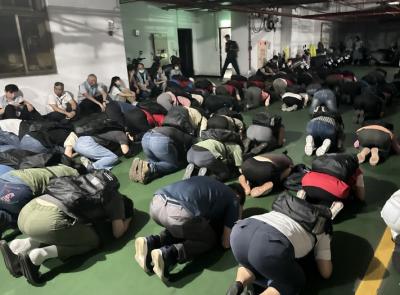
Taipei and other northern cities are to host air-raid drills from 1:30pm to 2pm tomorrow as part of urban resilience drills held alongside the Han Kuang exercises, Taiwan’s largest annual military exercises. Taipei, New Taipei City, Keelung, Taoyuan, Yilan County, Hsinchu City and Hsinchu County are to hold the annual Wanan air defense exercise tomorrow, following similar drills held in central and southern Taiwan yesterday and today respectively. The Taipei Mass Rapid Transit (MRT) and Maokong Gondola are to run as usual, although stations and passenger parking lots would have an “entry only, no exit” policy once air raid sirens sound, Taipei
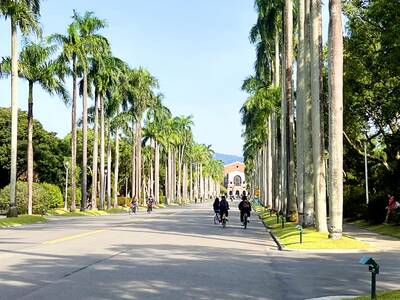
Taipei placed 14th in the Quacquarelli Symonds (QS) Best Student Cities 2026 list, its highest ever, according to results released yesterday. With an overall score of 89.1, the city climbed 12 places from the previous year, surpassing its previous best ranking of 17th in 2019. Taipei is “one of Asia’s leading higher-education hubs,” with strong employer activity scores and students “enjoying their experience of the city and often keen to stay after graduation,” a QS staff writer said. In addition to Taipei, Hsinchu (71st), Tainan (92nd), Taichung (113th) and Taoyuan (130th) also made QS’ list of the top 150 student cities. Hsinchu showed the
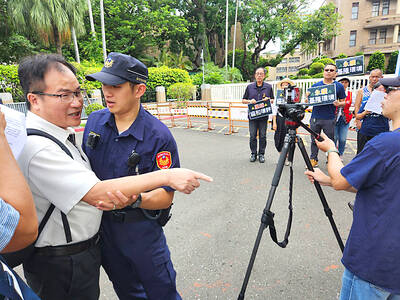
Environmental groups yesterday filed an appeal with the Executive Yuan, seeking to revoke the environmental impact assessment (EIA) conditionally approved in February for the Hsieh-ho Power Plant’s planned fourth liquefied natural gas (LNG) receiving station off the coast of Keelung. The appeal was filed jointly by the Protect Waimushan Seashore Action Group, the Wild at Heart Legal Defense Association and the Keelung City Taiwan Head Cultural Association, which together held a news conference outside the Executive Yuan in Taipei. Explaining the reasons for the appeal, Wang Hsing-chih (王醒之) of the Protect Waimushan Seashore Action Group said that the EIA failed to address